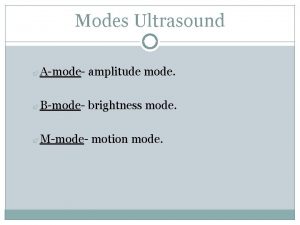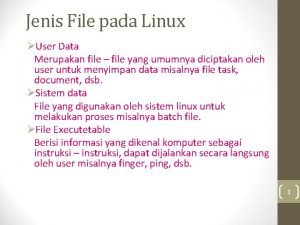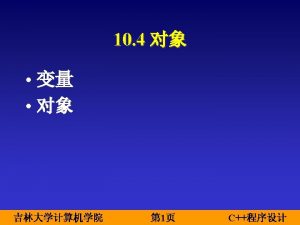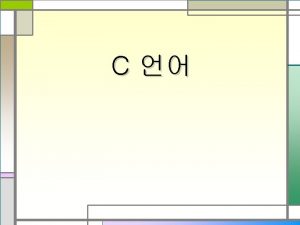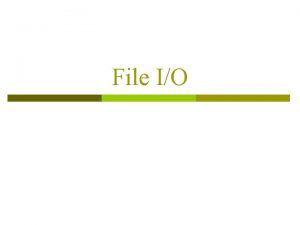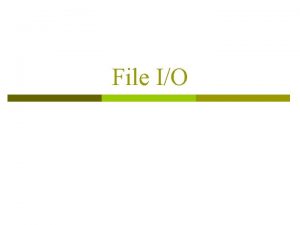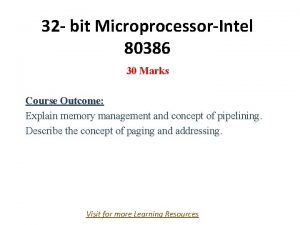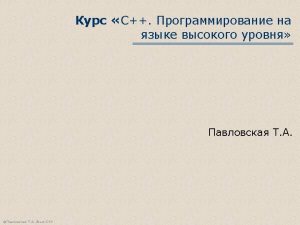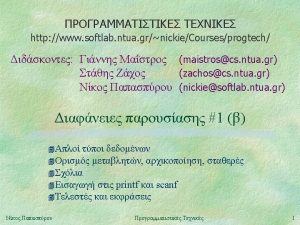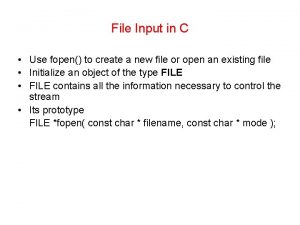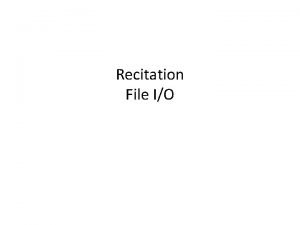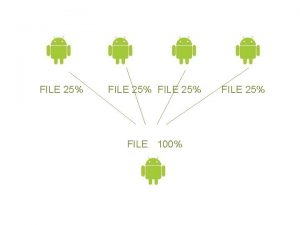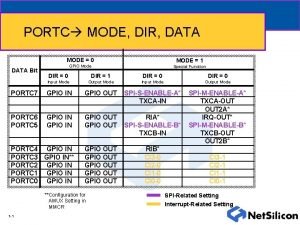MAN FILE fopen char Filename char Mode Filename









![#include <stdio. h> int main(void) { FILE *fp; char str[80]; if ((fp = fopen #include <stdio. h> int main(void) { FILE *fp; char str[80]; if ((fp = fopen](https://slidetodoc.com/presentation_image_h2/7245d43e0c9faaf8065c6c579f4442cc/image-10.jpg)




- Slides: 14

MAN

FILE *fopen (char *Filename, char *Mode); § Filename § Path of the file § Mode § How do you use the file? § Use header stdio. h § Returns a pointer to the opened file § If fails returns NULL

§ Read mode ("r") § if file is unavailable error § Write mode (“w") § if file is unavailable created § Overwrite § Append mode (“a") § if file is unavailable created

int fclose (FILE *fp); § In order to improve efficiency most file system write data to disk one sector at a time § fclose flushes the buffer

CHARACTER int fgetc (FILE *fp); § Similar to getchar() int fputc (int ch, FILE *fp); § Similar to putchar()

§ reading a text file and displaying it in the screen #include <stdio. h> int main(void) { FILE *fp; if ((fp = fopen ("a. txt", "r"))!=NULL){ while (! feof (fp)){ putchar (fgetc(fp)); } fclose (fp); } return 0; }

OF FILE int feof (FILE *fp); § Returns § non zero if fp reached end of file § Zero otherwise int ferror (FILE *fp); § Returns § non zero if error occured § Zero otherwise END

STRINGS/LINES int fputs (char *str, FILE *fp); int fgets (char *str, int num, FILE *fp); § Reads characters from the file associated with fp into string pointed by str until § num-1 characters have been read or § A newline character is found or § End of file

#include <stdio. h> int main(void) { FILE *fp; if ((fp = fopen ("a. txt", "w"))!=NULL){ fputs("Write test", fp); fclose (fp); } return 0; }
![include stdio h int mainvoid FILE fp char str80 if fp fopen #include <stdio. h> int main(void) { FILE *fp; char str[80]; if ((fp = fopen](https://slidetodoc.com/presentation_image_h2/7245d43e0c9faaf8065c6c579f4442cc/image-10.jpg)
#include <stdio. h> int main(void) { FILE *fp; char str[80]; if ((fp = fopen ("a. txt", "w"))!=NULL){ fputs("Write test", fp); fclose (fp); } if ((fp = fopen ("a. txt", "r"))!=NULL){ fgets(str, 4, fp); fclose (fp); printf(str); } return 0; }

FORMATTED int fprintf (FILE *fp, format speci, variable(s)); § Just like printf. § Return § ON SUCCESS: the number of bytes output § ON FAILURE: returns EOF int fscanf (FILE *fp, format speci, address(es)); § Just like scanf. § Return § ON SUCCESS: Number of scanned inputs. § ON FAILURE: fscanf returns EOF

#include <stdio. h> int main(void) { FILE *fp; int n, x; scanf("%d", &n); if ((fp = fopen ("a. txt", "w"))!=NULL){ fprintf(fp, "%d", n); fclose (fp); } if ((fp = fopen ("a. txt", "r"))!=NULL){ fscanf(fp, "%d", &x); fclose (fp); printf("n%dn", x); } return 0; }

§ File handle : FILE * § Open a file : fopen § Input/Output § Character IO : getc, putc § Line/String IO : fgets, fputs § Formatted IO : fscanf, fprintf § Close a file : fclose

§ Dr. S. M. Farhad § Johra Muhammad Moosa
 Man vs man conflict
Man vs man conflict Bmode
Bmode File-file yang dibuat oleh user pada jenis file di linux
File-file yang dibuat oleh user pada jenis file di linux For output as #1
For output as #1 Char char slide
Char char slide Const char * vs char * const
Const char * vs char * const Readtext r
Readtext r Fopen sar
Fopen sar Fopen msdn
Fopen msdn Msdn fopen
Msdn fopen Focus mode and diffuse mode
Focus mode and diffuse mode Mode địa chỉ tức thì là mode
Mode địa chỉ tức thì là mode Difference between real protected and virtual mode of 80386
Difference between real protected and virtual mode of 80386 Timer in microcontroller
Timer in microcontroller Gartner mode 1 mode 2
Gartner mode 1 mode 2

